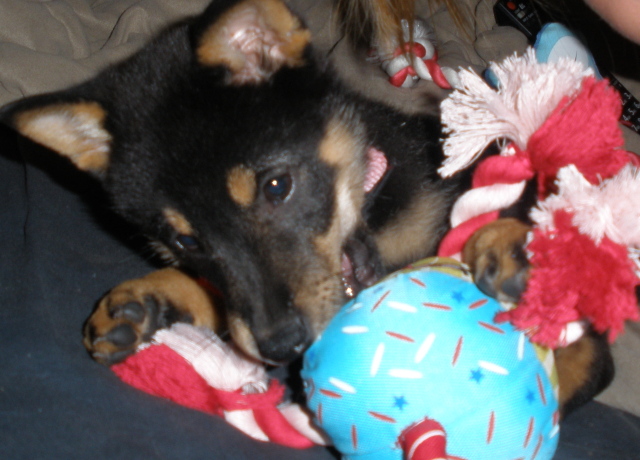QuestionDear Dr. Connor,
My husband and I recently adopted a terrier mix (looks a lot like a Glen of
Imaal). She's about 3 or 4 years old. We do not know a lot about her history.
She was found as a stray and was fostered until she had a litter of puppies.
When the puppies found home (after 8 weeks or so), she came home with us.
We decided to work on crate training right away. Not only does this seem like
a great housetraining tool -- I feel it will make travel and any stays she has
with friends an easier experience for them.
On the first day, I threw some treats in to get her used to going in and out.
That evening we had to really guide her into the crate for bed. We closed the
door. She settled right down and slept the night. A similar thing happened
the next night. Soon, however, she was resisting going into the crate. One
night she went completely limp and froze so as to resist being moved. No
treat was tempting at that point. I thought I might hurt her if I physically put
her in, so I tied the leash to the back of the crate and hooked her up. After a
few minutes, she chose to go in. As the days went on though, short tantrums
turned into longer tantrums -- high pitched barking and scratching
frantically at the floor. She was panting very heavily. On a few days during
the week, she had come to work with me and stayed in the car in the crate
for a short time. On Monday, a rain storm hit -- it may have been scary.
That night, she again refused to go in the crate and also barked and
scratched when I hooked her up to the leash. My husband and I gently buy
firmly put her into the crate which was followed by a loud and sleepless night.
The next night was the same.
I couldn't tell if she was truly terrified of something -- or if she was just
throwing a tantrum. In desperate need of sleep, we put her in another room
with the crate (and tried to remove anything else comfortable), left the crate
door open and closed the door to the room. She whined a little but then went
to sleep. Slowly, each night, her protests grow longer. Last night, she
learned that by getting into mischief (crashing or excessive scratching) will
result in me coming in.
I had a trainer come out to help give me guidance. She thought the dog
sounded traumatized and that I should get a completely new crate and start
over -- that I should not even close the door for a few weeks. I really hear
what she is saying -- but I am frustrated by the practicality of that. I need to
sleep. I need to be able to leave the house. And I can't wait several weeks to
do those things.
Some more info: We are walking her several times a day. She has just begun
a training class. Whenever I leave, I try to provide a bully stick or kong of
some kind to keep her busy. I've found however that she tends not to chew
on these things when I go. She enjoys time alone -- often chooses to be
outside alone, resting. She seems to do okay when left alone in the backseat
of the car -- no tantrums there so far.
I think what I'm really wondering is how to not traumatize her with the crate -
- but not totally let her call all the shots. If I put her into the crate and let her
bark it out ... will I ultimately sabotage our crate training? Or is that part of
what I need to do?
I'd love any insights you can offer!
Kind regards,
Erin
AnswerYou introduced the crate inappropriately -- the trainer is right. And given the dog's escalating fear response (your description of her "freezing" is a fear response: fight/flight/freeze, many dogs become aggressive so count yourself lucky) it appears that the crate will soon become an object of terror that the dog will never accept. Chaining her to it was the absolute worst thing you could have done; that sort of restraint is very punishing and even unfair.
Separation issues don't seem a be problem (yet); you describe that your dog voluntarily removes herself from you to sleep outside and dogs with separation anxiety don't normally do this. It appears to me that the night time experience is the problem; the dog was immediately conditioned to experience it as isolating and (ultimately) punishing. Her scratching at doors because of her acquired reaction is WORKING since it does get your attention, and thereby you have TRAINED it inadvertently. Her high pitched barking and scratching at the floor is hysteria and fear, this is NOT a tantrum. The fact that she is choosing not to interact with the toys you provide when you leave her alone may mean she is stressed and making a connection (generalizing) the night time experience (your night time regimen may be setting this dog up for serious separation anxiety) OR she has never HAD such objects and is not comfortable enough yet to settle down and check them out.
I'm wondering how this dog would react to being left in the room during the day (rather than leaving her in the car.) Remove the crate (you have to reintroduce it at a later time.) Give her a sleeping pad or bed and a bowl of water and try leaving her there for a very short interval one day (an hour). Don't make comment, no eye contact, no long goodbyes, just matter of factly put her in the room, then leave. When you return, wait a minute or two before greeting the dog then greet her warmly but keep it short. If you see no destruction or evidence of stress (barrier frustration such as chewing door frame, etc), then you can extend this leavetaking the next time for several hours; this is a desensitizing routine intended to help the dog feel secure and calm alone in this space for however long is required so that you can consider it safe to leave the dog in this space whenever you are not at home. If you see enormous destruction (chewing door frame, chewing walls, loss of bowel control, etc.), then you have to repost to treat this separation anxiety (I'm hoping it hasn't escalated to that.)
At night, you need to retrain this dog to sleep alone in her area, even if it means your sleep will be interrupted. You cannot do ANYTHING to reward or "punish" her behavior, since it will prolong and worsen the behavior and perhaps create a further fear association (something you definitely don't want!) She isn't being a brat; she isn't throwing a tantrum; she's frightened and isolated, much like a child left in the dark might be, and you need to be a patient "parent". If she had been allowed to habituate to this circumstance in the first few nights (minus the crate), there most likely wouldn't be a problem now. Ignoring it totally might be too late, but you have to try it. You will be (at first) attempting to extinguish whatever contribution you have made to this by responding to her and you should see within a short time (two or three nights) whether or not this will work. If her caterwauling increases, you'll have to repost so we can plan the next level of treatment.
Meanwhile, put the crate away; once the dog has settled down in your home and feels secure and part of your family, you can introduce it very slowly. Once a day, you place a prized object (piece of hot dog) in the crate, leave the door open, and sit casually observing the dog. Give her up to 30 minutes to decide whether or not she wants the hot dog; if she chooses not to eat it, remove it and end the exercise. Sooner or later, she will want the prize and she will (slowly) figure out a way to get it without going into the crate (dogs are ingenious at this and it's actually a test of intelligence and problem solving.) Making it highly interesting and rewarding for her to voluntarily enter the crate (even for short intervals) will slowly desensitize her fear of it. Over time, offering special treats (and using play training with the crate as part of the experience) can make of the crate what it should be: a temporary, safe place for the dog. Some dogs never accept crates so be prepared that this might be this dog's experience.

 Agressive 1 yr old mini goldendoodle
Question
our millie
My husband and I got our min
Agressive 1 yr old mini goldendoodle
Question
our millie
My husband and I got our min
 My Shiba Inu
Question
Lola
I bought a registered Shiba Inu puppy fro
My Shiba Inu
Question
Lola
I bought a registered Shiba Inu puppy fro
 My dog is shaking and hiding under my bed recently
QuestionRorrie and Pencil
QUESTION: My dog, Rorr
My dog is shaking and hiding under my bed recently
QuestionRorrie and Pencil
QUESTION: My dog, Rorr
 Psychological trauma
Question
Izzy
I recently took my 1 year old dog to a fr
Psychological trauma
Question
Izzy
I recently took my 1 year old dog to a fr
 aggression in aging dog
Question
Niko
I have a thirteen year old, female, Samoy
aggression in aging dog
Question
Niko
I have a thirteen year old, female, Samoy